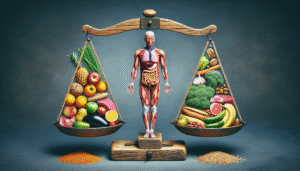Whey vs. Plant-Based Protein: Which is Better?
Understanding Protein Sources
When it comes to dietary protein, two popular options dominate the market: whey protein and plant-based protein. Both types offer distinct advantages and disadvantages that can affect an individual’s health and fitness journey. This article explores these two protein sources in detail, examining their nutritional profiles, health benefits, and considerations for different dietary needs.
What is Whey Protein?
Whey protein is a complete protein derived from milk during the cheese-making process. It consists of several components, primarily beta-lactoglobulin, alpha-lactalbumin, and immunoglobulins. It is available in various forms, including whey protein concentrate, isolate, and hydrolysate.
- Whey Protein Concentrate (WPC): Contains about 70-80% protein with a moderate amount of fat and lactose.
- Whey Protein Isolate (WPI): Contains about 90% protein and minimal fats and carbohydrates, suitable for those lactose-intolerant individuals.
- Whey Protein Hydrolysate (WPH): Pre-digested for faster absorption, typically used in clinical protein supplementation.
What is Plant-Based Protein?
Plant-based protein is derived from various plant sources such as legumes, whole grains, nuts, seeds, and vegetables. Unlike whey protein, which is animal-based, plant protein can be sourced from a diversity of foods, offering additional nutrients. Popular plant-based protein sources include:
- Pea Protein: Extracted from yellow split peas, rich in essential amino acids and easily digestible.
- Soy Protein: Made from soybeans and is one of the few plant proteins that is a complete protein.
- Hemp Protein: Derived from hemp seeds, rich in Omega-3 fatty acids and fiber.
- Brown Rice Protein: Provides protein without many allergens but lacks some essential amino acids.
Nutritional Breakdown
The nutritional profiles of whey and plant-based protein can vary greatly based on their source and preparation. Here’s a comparison of key factors.
Amino Acid Profile
-
Whey Protein: Contains all nine essential amino acids, making it a complete protein. It’s especially high in branched-chain amino acids (BCAAs) like leucine, which is vital for muscle growth and recovery.
- Plant-Based Protein: Not all plant proteins are complete; for example, rice protein is low in lysine while pea protein might be deficient in methionine. However, a blend of different plant proteins can provide a complete amino acid profile.
Digestibility
-
Whey Protein: Highly digestible with a biological value (BV) of 104 to 110, meaning it is efficiently utilized by the body.
- Plant-Based Protein: Generally have a lower BV (typically ranging from 60-85), but some sources like soy protein have a higher BV than other plant options.
Health Benefits
Whey Protein
-
Muscle Growth and Recovery: Due to its high BCAA content, whey protein is particularly beneficial for muscle growth, making it a popular choice among athletes.
-
Weight Management: Whey protein helps in weight loss by increasing the feeling of fullness and elevating metabolism.
- Immune Support: Contains immunoglobulins and lactoferrin, which can improve immune function.
Plant-Based Protein
-
Higher Fiber Content: Many plant proteins come with additional fiber, which aids digestion and supports intestinal health.
-
Antioxidant Properties: Plant sources are often rich in antioxidants, contributing to reduced inflammation and improved overall health.
- Heart Health: Many plant proteins, especially those derived from legumes and nuts, can lower cholesterol levels and reduce the risk of heart disease.
Environmental Impact
Another important factor to consider in the debate between whey and plant-based protein is their environmental impact.
-
Whey Protein: Being a dairy product, whey protein contributes to the carbon footprint associated with livestock farming. Water usage and greenhouse gas emissions are significant concerns.
- Plant-Based Protein: Generally, plant-based proteins have a much lower environmental impact. They require less water and land and typically produce fewer greenhouse gases compared to animal-based products.
Dietary Considerations
Choosing between whey and plant-based protein may depend on specific dietary needs.
Lactose Intolerance and Allergies
-
Whey Protein: Contains lactose, which can be problematic for those who are lactose intolerant. However, whey protein isolate may be tolerated better due to its lower lactose content.
- Plant-Based Protein: Generally free from lactose and suitable for vegans. They also offer more variety for those with allergies to dairy, eggs, or other animal products.
Vegan and Vegetarian Diets
-
Whey Protein: Not suitable for vegans or strict vegetarians.
- Plant-Based Protein: Ideal for those following a vegan or vegetarian diet, offering a spectrum of nutritional benefits without animal-derived ingredients.
Cost Comparison
Price can also be a deciding factor in choosing between whey and plant-based protein.
-
Whey Protein: Generally, whey protein tends to be more affordable, particularly in bulk due to the widespread availability and production.
- Plant-Based Protein: Often more expensive, especially for high-quality, certified organic sources. However, prices have been decreasing due to rising demand and competition in the market.
Flavor and Texture
Flavor and texture can influence a consumer’s protein supplement choice significantly.
-
Whey Protein: Often recognized for its smooth texture and pleasant taste, easily mixed into shakes, smoothies, and baking recipes.
- Plant-Based Protein: Can sometimes have a grainy texture or earthy taste. Innovations in blends help mitigate these issues, but flavor can still be a barrier for some users.
Conclusion of Choices
Both whey and plant-based proteins have unique advantages. The choice between them often hinges on an individual’s dietary preferences, health goals, and ethical considerations. For someone looking for rapid muscle recovery or growth, whey protein may be the optimum choice. Conversely, individuals pursuing a vegan lifestyle, seeking to reduce their environmental impact, or managing dairy allergies may find plant-based protein the more suitable option.
Final Notes
As the protein supplement industry continues to evolve, both whey and plant-based proteins will likely see improvements in formulation and adaptation to consumer needs. It’s important to evaluate personal health goals, dietary restrictions, and preferences before making a decision on which protein source to incorporate into your nutrition regimen.








